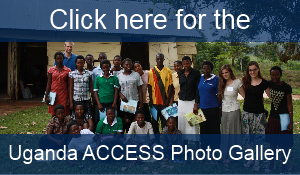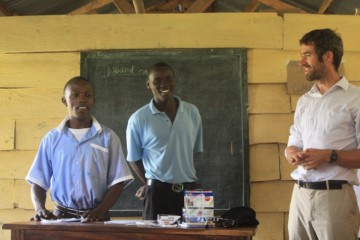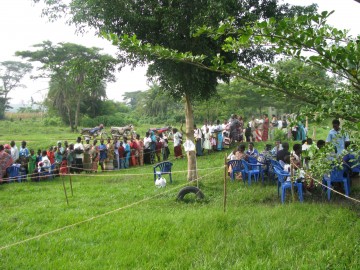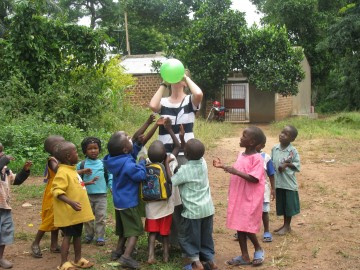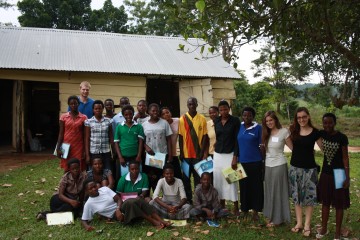Note: The Uganda ACCESS Project is no longer recruiting students.
2016 Team Leader: Tahreen Mohamed (tahreen.mohamed@gmail.com)
Location: Nakaseke District, Uganda
Positions: 4
Faculty Supervisor: Dr. Videsh Kapoor
Website: https://ubcaccess.wordpress.com/
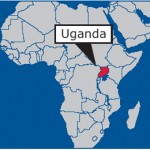 GHI ACCESS came to realization after a site visit in the summer of 2009 by two UBC GHI (Global Health initiative) students. In the fall of the same year Dr. Robert Kalyesubula, the director of ACCESS (African Community Center for Social Sustainability) met with Dr. VideshKapoor, director of UBC Family Medicine Global Health Division. Founded in 2002 by Dr. Robert and James Sewanyana, ACCESS is a community based organization in the Nakaseke district of Uganda that operates a medical clinic (LifeCare Center). They are dedicated to supporting the local community through medical care, education, economic empowerment, and training Community Health Workers. ACCESS provides care and support to people living with HIV/AIDS, orphans and vulnerable children through several initiatives. Currently ACCESS is working to replace the nursing-aide school with a larger nursing school scheduled to open in 2015.
GHI ACCESS came to realization after a site visit in the summer of 2009 by two UBC GHI (Global Health initiative) students. In the fall of the same year Dr. Robert Kalyesubula, the director of ACCESS (African Community Center for Social Sustainability) met with Dr. VideshKapoor, director of UBC Family Medicine Global Health Division. Founded in 2002 by Dr. Robert and James Sewanyana, ACCESS is a community based organization in the Nakaseke district of Uganda that operates a medical clinic (LifeCare Center). They are dedicated to supporting the local community through medical care, education, economic empowerment, and training Community Health Workers. ACCESS provides care and support to people living with HIV/AIDS, orphans and vulnerable children through several initiatives. Currently ACCESS is working to replace the nursing-aide school with a larger nursing school scheduled to open in 2015.
The 2016 team conducted research which focused on evaluating two family planning models delivered by ACCESS: a central outpatient clinic and family planning services delivered by community health workers. Clinic and community health worker clients participated in surveys which evaluated the quality of the services and the client's knowledge about family practice. After the delivery of the surveys, the team conducted focus groups with the participants which explored family practice attitudes, barriers and common themes.
They also delivered sexual education seminars to secondary school students with the aim of educating the community about safe sexual practices so as to limit the rampant spread of disease.In addition, the team trained nurses in the newly opened Nursing school to deliver these seminars to their community members so as to develop a self-sustaining model of education.
As in the previous years, they organized two free Community Health Days during which more than 600 patients from Nakaseke and the surrounding communities were triaged and screened for HIV, diabetes and malaria before they were provided free medical care and treatment for a variety of conditions.
ACCESS Uganda is currently in a transition period and is moving towards becoming a more autonomous organization.
2010 represented the pilot year of the collaboration between UBC GHI and ACCESS. A team of four, two medical and two nursing students, visited Nakaseke to conduct a needs assessment and investigate the possibility for cooperation between ACCESS and the GHI. This team identified health education of both the ACCESS nursing-aide students and Nakaseke-area secondary school students as being of benefit to the community in the form of increased community health awareness, and increased competency on the part of the nursing-aides.
In June-July 2011, a team of four medical students traveled to Nakaseke to deliver health seminars (topics were identified by the ACCESS director) at the ACCESS nursing-aide school, following which, 12 nursing-aide students were trained to teach the seminars. Teams of UBC medical students and ACCESS nursing-aide students collaboratively taught at three nearby secondary schools, with a gradual transfer of leadership to the nursing-aides who subsequently organized their workshops for the community health workers in Luganda and English. In order to evaluate the efficacy and sustainability of the 2011 curriculum, research was conducted through pre and post-tests to gaugeing learning outcomes, trends, and gaps which have helpedthat helped identify possible changes to the next year’s curriculum for the following year. This research was presented at the Global Health Education Consortium (GHEC) conference in Montreal in November. Subsequent tests were administered six months after the seminars to assess knowledge retention of the nurses at ACCESS.
In June-July 2012, another team of four medical students traveled to Nakaseke and delivered another set of health seminars to both the nursing-aide students and secondary school pupils. Using the data acquired by the 2011 team, lessons plans and teaching methodology were modified to better improve knowledge acquisition and retention. The team performed research comparing the knowledge acquisition of secondary school students taught by the UBC team to those taught by the nursing-aides. These findings showed no difference in knowledge acquisition indicating that the nursing-aides students were well prepared to deliver the health seminars.
The 2013 GHI team continued to deliver an ever improving set of health seminars to community health workers and secondary students as developed by the previous teams. The topics covered were Sexual Health and HIV, Life-Skills, and First-Aid. Additionally they introduced a seminar on Early Childhood Nutrition to the community health workers, a need identified in previous years. Focus groups were also run with community workers and community members to investigate the current early childhood nutrition practices in the community and to look for ways to improve these practices.
The 2014 team continued to build on the work of the previous teams. They conducted a survey assessing the knowledge retention and teaching practices of the Community Health Workers from the early childhood nutrition seminars of 2013. CHWs were also invited to share more about their successes and the barriers they face in a discussion group format. While significant challenges remain, the time and financial cost of giving seminars chief among them, they all affirmed that community members are learning more about early childhood nutrition and are putting this knowledge into practice. The team also continued the lessons with CHWs and secondary students, all of whom were friendly and eager to learn, their enthusiasm and engagement inspiring.
Though the project’s main aim is building and delivering a curriculum that is relevant, engaging, culturally sensitive and sustainable, there are many opportunities for clinical exposure. The GHI team had the chance to shadow both locally, at Nakaseke hospital, and at a tertiary care center, Mulago hospital in Kampala. Some time was spent on the wards, and some in the operating theatre, giving the students a chance to see a wide range of medical practice in different settings. All of these experiences were educational in showing the contrast between rural and urban health care, and how disease is managed in resource-limited settings. They also provided an opportunity to work with skilled residents and physicians.
The UBC GHI team also helped ACCESS staff, local physicians, and community health workers organize two free Community Health Days. In just two days, around 1000 patients from Nakaseke and surrounding communities are triaged and screened for HIV, diabetes, and malaria before they are provided free medical care and treatment. A full team effort is required for its success, including the ACCESS staff (James, Dr. Robert, and Ronald Kiyemba, the ACCESS coordinator), and the UBC GHI team. In recent years, a group of dentists has participated in Community Health Days, widening the range of health care provided. The UBC students took histories and vital signs, and even performed some physical exams while shadowing the clinicians.
The teams have also benefited from lectures from Dr. Robert on topics such as HIV and malnutrition. James has escorted them on community visits around Nakaseke to see firsthand the lives touched by ACCESS, from HIV patients, to vulnerable children, to community health workers. The welcoming, simple, and serene lifestyle in Nakaseke was a wonderful experience in itself, being surrounded by the natural beauty of the farmlands filled with maize and coffee beans; mango, papaya, and avocado trees; and, of course, chickens, goats, cows, and pigs.
Each team leaves having experienced the challenges of global health care, and having gained a deeper understanding of Ugandan culture and an appreciation for the adversities and disparities facing those living in a resource-limited setting. But the best part of the experience is building relationships with the amazing people at ACCESS.
2015 will be a big year for ACCESS with the opening of the nursing school anticipated to happen as early as spring. The 2015 team will most likely continue to build on the work of past teams and potentially take the project in a new direction. One possibility would be to explore how improvements in hand hygiene could be made in the Nakaseke community. Another would be to find ways for the seminars to be maintained and updated sustainably within the community, rather than requiring annual input from UBC teams. They will have the chance to investigate ways the UBC GHI can partner with the new ACCESS nursing school. The 2015 team will also continue to deliver seminars to community health workers and secondary school students, to be involved in shadowing in Nakaseke and Mulago hospitals, and to help out with Community Health Days at LifeCare Centre.
